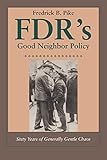FDR's Good Neighbor Policy : Sixty Years of Generally Gentle Chaos / Fredrick B. Pike.
Material type: TextPublisher: Austin : University of Texas Press, [2021]Copyright date: ©1995Description: 1 online resource (422 p.)Content type:
TextPublisher: Austin : University of Texas Press, [2021]Copyright date: ©1995Description: 1 online resource (422 p.)Content type: - 9780292755765
- 327.73080904
- online - DeGruyter
| Item type | Current library | Call number | URL | Status | Notes | Barcode | |
|---|---|---|---|---|---|---|---|
 eBook
eBook
|
Biblioteca "Angelicum" Pont. Univ. S.Tommaso d'Aquino Nuvola online | online - DeGruyter (Browse shelf(Opens below)) | Online access | Not for loan (Accesso limitato) | Accesso per gli utenti autorizzati / Access for authorized users | (dgr)9780292755765 |
Frontmatter -- Contents -- Preface -- Section I. The Great Depression and Better Neighborliness in the Americas -- Section II. Inducements Toward Good Neighborliness -- Section III. Ambivalence of Mood: North Americans Contemplate Latin Americans -- Section IV. The Roosevelt Styles in Latin American Relations -- Section V. Launching and Targeting the Good Neighbor Policy -- Section VI. Security Issues and Good Neighbor Tensions -- Section VII. Farewell and Welcome Back the Good Neighbor Policy -- Notes -- Index
restricted access online access with authorization star
http://purl.org/coar/access_right/c_16ec
During the 1930s, the United States began to look more favorably on its southern neighbors. Latin America offered expanded markets to an economy crippled by the Great Depression, while threats of war abroad nurtured in many Americans isolationist tendencies and a desire for improved hemispheric relations. One of these Americans was Franklin Delano Roosevelt, the primary author of America's Good Neighbor Policy. In this thought-provoking book, Fredrick Pike takes a wide-ranging look at FDR's motives for pursuing the Good Neighbor Policy, at how he implemented it, and at how its themes have played out up to the mid-1990s. Pike's investigation goes far beyond standard studies of foreign and economic policy. He explores how FDR's personality and Eleanor Roosevelt's social activism made them uniquely simpático to Latin Americans. He also demonstrates how Latin culture flowed north to influence U.S. literature, film, and opera. The book will be essential reading for everyone interested in hemispheric relations.
Mode of access: Internet via World Wide Web.
In English.
Description based on online resource; title from PDF title page (publisher's Web site, viewed 26. Apr 2022)


